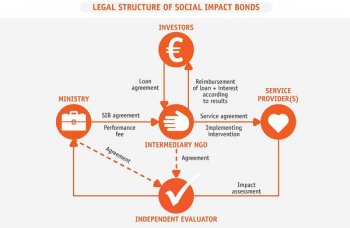
Good deeds Foundation
To launch the first social impact bond in Estonia, the state needs to announce a public procurement and conclude a performance-based agreement with the successful bidder.
Considering the Estonian context and the readiness of the parties, the optimal solution would be establishing a Special Purpose Vehicle (SPV) that participates in the public procurement. As a legal entity, the SPV would be a non-profit organisation established to act as an intermediary in the project, connecting the other parties of the project, concluding the contracts needed to implement the project and acting as a project manager.
Should this non-profit organisation be successful at the public procurement, the state would award it a contract for implementing the social impact bond project. In order to carry out the project, the intermediary would then conclude:
a) loan agreements with investors providing the up-front financing for the project,
b) contracts with the service provider(s) who would implement the agreed-upon intervention,
c) jointly with the contracting party, an agreement with an independent evaluator to assess whether the agreed-upon results have been achieved and the prerequisites for the outcome payment have been fulfilled.

The source of financing depends on the specific social impact bond model (including the legal form of the intermediary) and investors’ preferences (including the level of engagement). In the pilot project the up-front financing will be structured as a loan, deemed to be the most suitable and practical financing method for the selected framework. Depending on the structure of future projects and the participants’ preferences, financing may also take the form of convertible loans, convertible bonds, options or holdings.






















